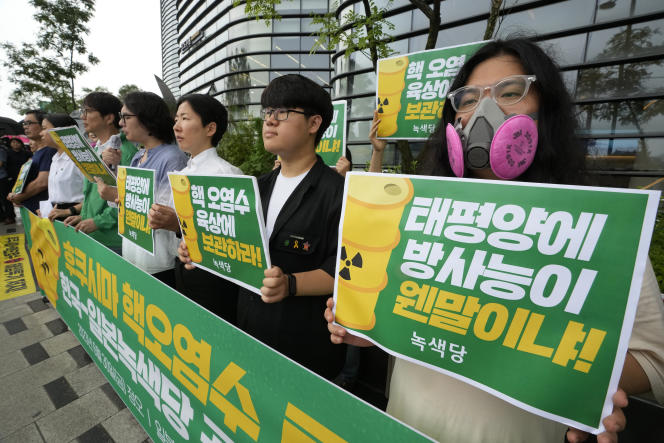The imminence of the discharge into the Pacific of contaminated water from Fukushima is causing a shortage of salt in South Korea, where the question has taken an eminently political turn. Faced with the emergency, the South Korean Deputy Minister of Fisheries, Song Sang-keun, announced Thursday, June 29 the sale, until July 11, of 50 tons of salt per day drawn from the reserves of ’emergency. This salt will be offered at a price 20% below market prices.
It’s hard to say if that will be enough when the operation at the Fukushima nuclear power plant (northeast of Japan) is due to begin this summer. It will result in the initial discharge of 1.25 million tonnes of water from the cooling of reactors damaged following the earthquake and tsunami of March 11, 2011.
The rejection will last the time of the dismantling of the site, that is to say about forty years. It is supported by the International Atomic Energy Agency, whose director general, Rafael Grossi, is expected Tuesday, July 4 in Japan. The Tokyo Electric Power Company (Tepco, owner of the Fukushima plant) says the water will be discharged after passing through its ALPS absorption filtration systems (“advanced liquid processing system”). The device makes it possible to reduce the presence of the nuclides that it still contains, with the exception of tritium. The water will be diluted so that the level of this nuclide is lowered to one-seventh of the standards set by the World Health Organization for drinking water.
Political twist
The operation, however, raises fears in the Archipelago, especially among fishermen from Fukushima and neighboring departments, but also in Taiwan, China and, above all, in South Korea, where the promises of Tepco and Tokyo do not convince. . A poll by the Gallup Institute revealed on June 30 that 80% of South Koreans fear the consequences of the Fukushima rejection. This fear is causing a consumer rush on sea salt, the prices of which jumped 27% in June compared to April. Some salt marshes, such as those in Sinan (South), have suspended their sales.
Enough to embarrass the government of President Yoon Seok-youl, engaged in a rapprochement with Japan which could result, among other things, in the lifting of restrictions imposed since the nuclear disaster on food products imported from the Fukushima region.
The question took a political turn since the Democratic Party (PD), the main opposition party, submitted a draft resolution to the National Assembly demanding that Japan abandon the project to dump the water. He requests the filing of a complaint with the International Tribunal for the Law of the Sea.
You have 40.29% of this article left to read. The following is for subscribers only.
